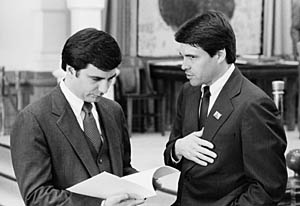Unfortunately, like the foolish farmer, recent Texas leadership is doing the same thing. A candid look at Texas reveals we are beginning to lag behind other states more and more in productivity and economic growth. In large measure this phenomenon is tied to the fact a majority of the Texas leadership, especially our governor, refuse to invest in the future of this state.
This state is lagging behind and rapidly approaching the status of a third-world country, not because we have spent too much or even because we have taxed too little. It is because of the fact we have not made wise investments of our tax money in the future of this state. For the last several years we have continued to elect people to be in charge of our public school system’s long-range policy who hold public education in contempt. Instead of concentrating on improving the quality of our state pubic education system, they continue to seek ways to circumvent it and cast too much of our educational resources in the hands of private or so-called charter schools. They have moved the investment of the public education funds from the hands of experts in investment and made it a political matter placed in the hands of amateurs who are motivated more by political persuasion than training in economics.
Our legislature continues to believe that quality of education can be enhanced by “gimmicks” and not by solid investments. Instead of seeking remedies for poor scores on evaluating testing, we have artificially raised our test scores by lowering standards. The state has shirked its responsibility mandated by our constitution by shifting the responsibility of funding public education from the state to local school districts. Instead of making funding of our state public education system a first-priority item, our legislature has forced an ever-increasing tax burden on homeowners and small businesses in the form of property taxes. Legislators and other state leadership have ignored the fact the cost of ignorance is far more expensive in the long run than the price of quality education. Our governor continues to boast about how well Texas ranks in the nation, ignoring the fact our public education system is rated by all experts in the field at 44th or 45th of all the 50 states of the union.
In the field of public education, where Texas once was a leader in the nation in providing affordable higher education to its citizens, Texas is quickly turning our public institutions into private colleges beyond the reach of middle-class Texans. Instead of investing in higher education, the Legislature has authorized local boards of regents to set tuition wherever they choose. While not alleviating the financial needs of college to a great deal, we have in fact tripled and quadrupled the cost of higher education in this state for many of our citizens. Too many members of our state government regard research as academic snobbery, and the attractions of merit scholars and distinguished professors to be a waste of money.
For shortchanging public and higher education in this state, future generations will continue to pay the price of having the lowest paying jobs in the country, attracting fewer and fewer high-end industries and eventually continuing to rank with the most backward states of the nation.
Failure to take a holistic and long-term view of other social problems will ultimately ill serve our state. Our penal system is a prime example. While we rank with several nations of the world with the number of people incarcerated, we refuse to take full advantage of alternate systems of judicial punishment. Most who have studied the system realize corrective punishment and rehabilitation can be accomplished at a fraction of the cost of incarceration behind concrete and steel. Intensive incarceration can be as costly to Texas taxpayers as keeping a medical student in our finest medical school. We could easily double our number of parole and probation supervisors. And benefit with greater results. We could accomplish punishment and rehabilitation, while at the same time allowing those convicted of non-violent crimes to be productive, and in large measure, pay for their own punishment. Many of the draconian punishments insisted on by law-and-order advocates in our legislative system have not resulted in Texas having the lowest crime rate in the nation.
A failure to take a long-term view of our health problems in this state have resulted in the waste of millions and millions of dollars. Failure to spend what is needed for the health of children in this state has caused us to leave millions on the table to be spent in other states; partially funded by money sent to Washington by Texas’ taxpayers. Texas has little or no preventative medicine program for those citizens here in the greatest need. As an example, Hispanic Texans have and suffer from five times the incidence of diabetes as Caucasians. It is well known and established in medical circles that identification of diabetes and conservative treatment through change of lifestyle and diet can control well over 50% of the incidents of this dread disease; and yet, Texas has virtually no program in place to address these needs. Instead, our Texas health program will spend billions on the aftereffects of diabetes and only a pittance on its prevention.
Until the voting citizens of Texas start demanding investment in the future rather than platitudes and empty brags, our state will continue to lag behind many other states of this union, not taking full advantage of the precious resources of this state, which include future generations of Texans.





